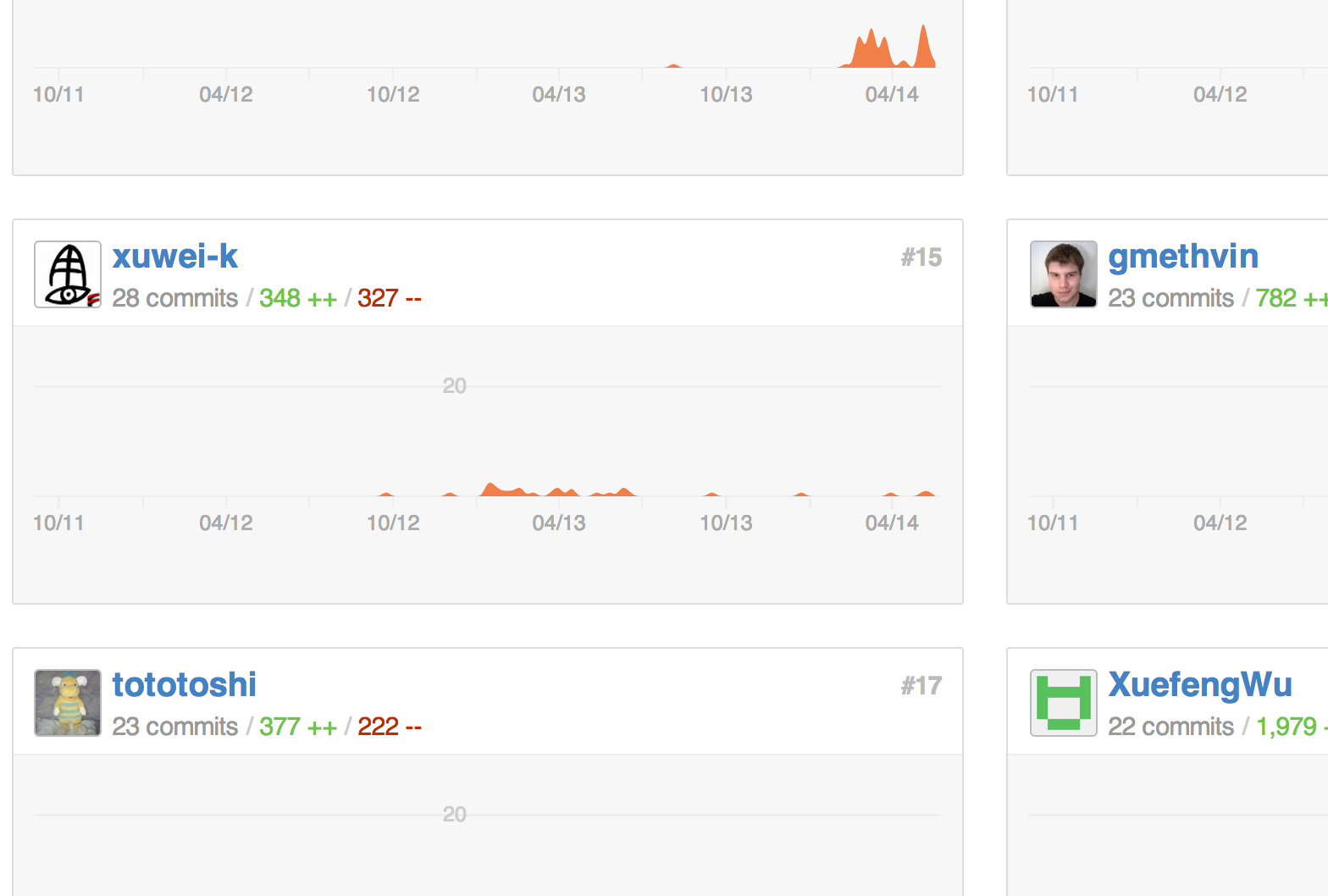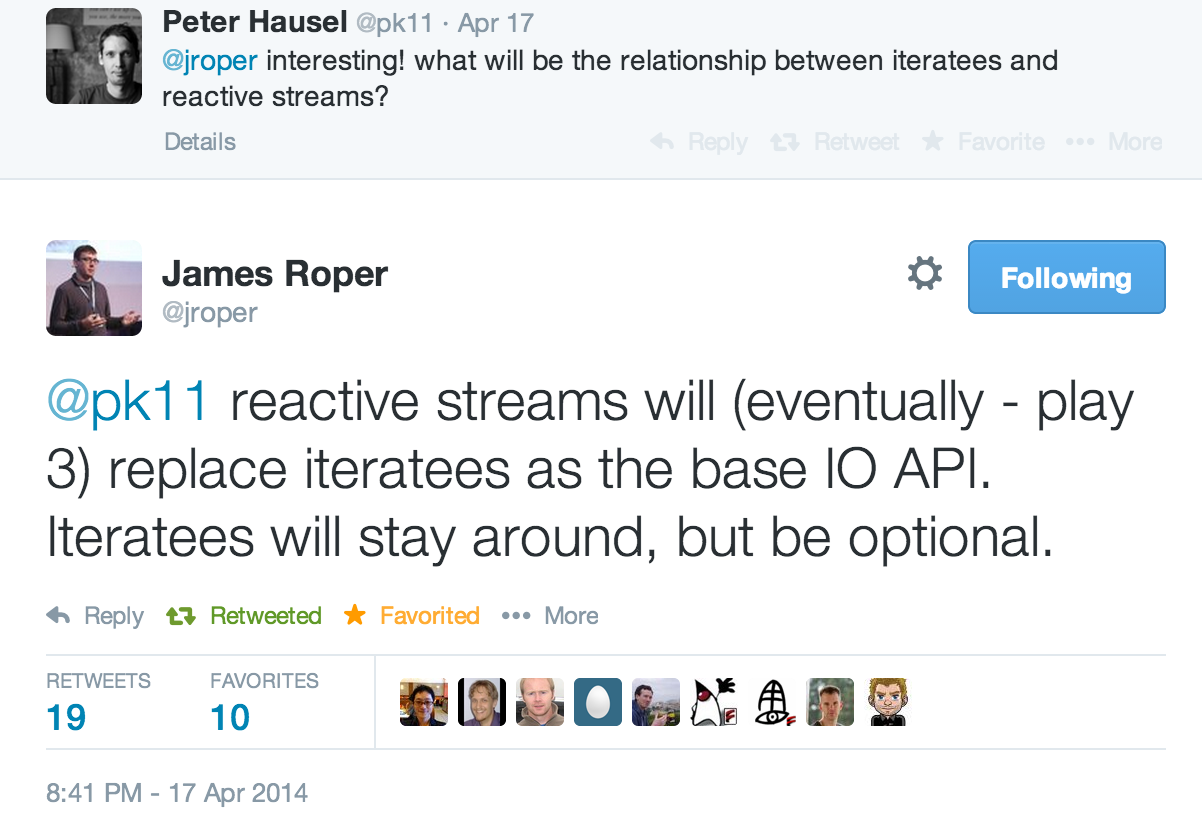
- twitter @xuwei_k
- github @xuwei-k
- blog http://d.hatena.ne.jp/xuwei/
- 2014年3月からドワンゴで働いてる(まだ3ヶ月)
- 2013年、Scalazに一番多くコミットした人
日本人で一番play2にコミットしてるはず?

Iterateeはオワコンになるかも
(すでにHaskell界隈やScalaz界隈ではオワコン)
https://twitter.com/jroper/status/456759337470291968

Haskell界隈の事情(Iterateeはオワコンらしいが、それ以外で乱立)
- Unfiltered も趣味で使ってる、貢献してる
- Scalatra を前々職で仕事で使ってた
社内Scala事情
- 社内のScalaのプロジェクトはほぼPlay2
- Scalaのプロジェクト6〜7個以上ある?(自分も把握できてない)
- Scalaを書いてるプログラマは30人以上?( 出典@mesoさん )
以下の様なことを話したいが、詰め込み過ぎたので、全部丁寧に話せるか謎
- 型クラスとは?
- play2に存在する型クラス
- Scalaにおける型クラスとは?
ApplicativeとMonad- Play の
ReadsやWritesなどが、なぜあのような書き方をするのか? - Play と Scalaz の比較
これから話すことは、どのversionでもそれほど大きく変わってませんが、特に言及がない場合は、play2.2.3とします
最終的な目標
case class Location(lat: Double, long: Double)
case class Resident(name: String, age: Int, role: Option[String])
case class Place(name: String, location: Location, residents: Seq[Resident])
(playの公式ドキュメントより引用)
これを理解できるように
implicit val locationReads: Reads[Location] = (
(__ \ "lat").read[Double](min(-90.0) keepAnd max(90.0)) and
(__ \ "long").read[Double](min(-180.0) keepAnd max(180.0))
)(Location.apply _)
implicit val residentReads: Reads[Resident] = (
(__ \ "name").read[String](minLength[String](2)) and
(__ \ "age").read[Int](min(0) keepAnd max(150)) and
(__ \ "role").readNullable[String]
)(Resident.apply _)
implicit val placeReads: Reads[Place] = (
(__ \ "name").read[String](minLength[String](2)) and
(__ \ "location").read[Location] and
(__ \ "residents").read[Seq[Resident]]
)(Place.apply _)
この2つの違い
implicit val placeReads: Reads[Place] = (
(__ \ "name").read[String](minLength[String](2)) and
(__ \ "location").read[Location] and
(__ \ "residents").read[Seq[Resident]]
)(Place.apply _)
implicit val placeReads: Reads[Place] = for{
name <- (__ \ "name").read[String](minLength[String](2))
location <- (__ \ "location").read[Location]
residents <- (__ \ "residents").read[Seq[Resident]]
} yield Place(name, location, residents)
for式 = モナド = カッコイイ!
と思ってる人はまだScala初心者(?)
あんな気持ち悪い(?)書き方をしているのは理由がある
play2にある型クラス
Monoid, Reducer, Functor, InvariantFunctor, ContravariantFunctor, Applicative, Alternative, Reads, Writes, OWrites, Format, OFormat, Writeable, ContentTypeOf, Formetter, QueryStringBindable, PathBindable, JavascriptLitteral
Play内部には、意外と型クラスがいっぱいある
勝手に3種類くらいに分類
- HaskellやScalazにもある型クラス
- Json関連の型クラス
- その他の型クラス
HaskellやScalazにもある型クラス
Monoid, Reducer, Functor, InvariantFunctor, ContravariantFunctor, Applicative, Alternative
- 実際それほど汎用的に使われてるわけではない?
- Jsonのために導入された感じ
その他
Writeable, ContentTypeOf, Formetter, QueryStringBindable, PathBindable, JavascriptLitteral
WriteableやContentTypeOfは、普通にやるぶんには、そこまで意識する必要ない- 独自のオブジェクトを、レスポンスとして返却する場合に使う(たとえば play-json4s )
Haskellで表現(1)
-- ちょっと省略してるので不正確
data JsResult a = JsSuccess a | JsError
class Writes a where
writes :: a -> JsValue
class Writes a => OWrites a where
writes :: a -> JsObject -- Haskellでは本当はオーバーライドは不可能
Haskellで表現(2)
class Reads a where
reads :: JsValue -> JsResult a
class (Writes a, Reads a) => Format a where
class (OWrites a, Reads a) => OFormat a where
Haskellで表現(3)
-- https://github.com/ekmett/contravariant/blob/v0.5.2/Data/Functor/Contravariant.hs#L76
class ContravariantFunctor a where
contramap :: (a -> b) -> f b -> f a
Haskellで表現(4)
instance Alternative JsResult where
-- 実装は略
instance Alternative Reads where
-- a -> f b において、fがAlternativeなら
-- 自動的にa -> f bもAlternative
instance ContravariantFunctor Writes where
-- Writesは実質単なる a -> JsValue という関数と同型なので
-- ContravariantFunctorになるのは当たり前
勘違いされがちなこと
- モナドは型クラスの1つにすぎない。そういう意味では何も特別ではない
- Scalaのimplicitは、ある意味型クラスのために導入されたという経緯(?)
- おだすきせんせーの論文
- implicitは型クラス以外のものにも使えてしまう
- 型クラスとしてのimplicitは便利なのでどんどん使おう(?)
Scalaでの型クラス
- 型クラスは
traitやclassで定義 型クラスのインスタンス定義方法は、以下のどれか
implicit val(lazy付く場合も)implicit def(引数ある場合とない場合と両方あり得る)implicit object
- 使う側は、
implicit parameterで受け取る
playでの具体例
型クラスのインスタンス定義
implicit object StringReads extends Reads[String] {
def reads(json: JsValue) = json match {
case JsString(s) => JsSuccess(s)
case _ => JsError(Seq(JsPath() -> Seq(ValidationError("error.expected.jsstring"))))
}
}
Readsのソースコード
なぜ型クラスを受け渡すのにimplicitを使うのか?
型クラスは、型によって値が一つに決まるから
(むしろ、そうでなければ型クラスと呼ばない?)
“型によって、値が一つに決まる”
ということは、
- 型さえ指定すれば、インスタンスが手に入る(
implicitlyや Context Bound) - 変数名を意識する必要ない、するべきでない
- 名前は重要ではない。型が重要
- 名前を指定して使うことがないなら、衝突しない限り機械的な名前でいいのでは?
- 名前を考える、名前を覚えるというコストがかかる行為せずに済む
“型によって、値が一つに決まる”
ということは、型パラメータをとらないimplicitなものは型クラスではない
Play2内部の以下のclass
ApplicationRequestLang
scala.concurrent.ExecutionContextscala.io.Codec- Databaseのライブラリでsessionを引き回すとか
一つに決まらない場合どうするのか?
- Haskellならnewtype
- ScalaだとHaskellに比べて新しい型を作るのが面倒(かつ、実行時コストかかる)
Scalaでの解決策
- implicitな部分に明示的に引数を渡す
スコープで制御できるならスコープで制御
- Scalaにはimplicitの解決に優先順位やスコープがあるので
親クラスの
implicitのほうが優先度低い- 優先順位は複雑(Scalaのversionによって微妙に異なる?)
- コンパニオンオブジェクトにimplicitなインスタンスあると、それを使いたい場合は便利だけど、使いたくない場合不便
- Tagged Type ?(それほど実用されてない。デメリットもあり)
実際仕事でjodatimeのDateTime型のReadsのインスタンスがReadsのコンパニオンに存在していて、しかしそれを使いたくない自体が発生して 面倒な状況に!
Monad と Applicative
MonadもApplicativeも単なる型クラスの1つ- play内部には
ApplicativeはあるがMonadは現状では存在しない Monadは必ずApplicative(Haskellでも次期versionで修正されるらしい)
Scalazのクラス図
なぜ Applicative が重要か?
MonadにもApplicativeにもなるが、Applicativeにする方法が2種類ある場合(言い換えると)
Monadにすることもできるが、それと整合性がないApplicativeが存在する- ZipList
- Play2 の
JsResult,Reads - Scalaz の
Validation
なぜ Applicative が重要か?
MonadにはならないがApplicativeになるものが存在する- そういう場合には、for式が使えない
- なので、最初に出した、気持ち悪い(?)記法
- もしくは、Scalazの
|@|という謎な記号
やっとplayの話
- playの
ReadsはApplicative - Scalaz知ってる人にとっては、以下の様なものだと思えばいい
type JsResult[+A] = Validation[Seq[Error], A] // ちょっと正確じゃない
trait Reads[A] {
def reads(json: JsValue): JsResult[A]
}
ReadsはJsValue => JsResult[A]と同型JsResultはApplicativeA => F[B]において、F[_]がApplicativeならばA => F[B]自体もApplicative
無理矢理まとめ(?)
- 重要なのは、playの
Readsは、Applicativeの仕組みによりエラーを蓄積する機能があるということ JsResult自体にエラーを含んでいるので、Reads自体は例外を投げるべきではない- できるだけ宣言的に書く
- Readsは合成可能
- エラーメッセージの国際化の機能まで組み込まれてる(?)
罠もある
- 法則満たさないケースが存在 http://d.hatena.ne.jp/xuwei/20131217/1387284363
scalaz.NonEmptyListやSemigroupがないので、JsResultの失敗の場合がただのSeqJsResultはもっと抽象化できる- https://github.com/playframework/playframework/pull/1904
- https://github.com/jto/validation
- 個人的にはこのライブラリもちょっと微妙な気がしている
- そもそもScalaz使えば(ry
- インスタンスが1つだけなら、基本的にコンパニオンオブジェクトに定義すると、勝手にスコープに入るので便利
ReadsもWritesも定義するなら、別々に定義するのではなく、Formatで一緒に定義したほうが整合性がとれて良い
- マクロで定義する機能もあるが、
applyが複数あると使えなかったり、case classのフィールド名変えるだけでJsonのkey変わってしまうので微妙
ライブラリ作りました
- http://d.hatena.ne.jp/xuwei/20140402/1396408213
- https://github.com/xuwei-k/play-json-extra
- Nullable(key自体が存在しない場合)に対応できない・・・
ReadsのコンパニオンにOptionのReadsがあるので)- key自体がない場合と、keyは存在してvalueがnullの場合と区別がある
readNullable[Int]とread[Option[Int]]- 2の22乗通りのメソッドを作れば・・・
ついでにもう一つライブラリ作ってます
ひたすら型クラスや難しい話をしたけど、型クラス以前にScalaにおける関数型プログラミングで大事なこと
- 例外をあまりつかわない(scala.util.Tryも)
- 副作用のあるものとないものを分離
- リフレクションできるだけ使わない
- できるだけimmutable
- sealedを使って代数的データ型
- varianceの話もしたかったが、無理ですよね
- 共変とか反変とか
これ素晴らしかったので、読むといいよ
- scodecという、シリアライズ、デシリアライズのライブラリ作ってる人
- scalaz-streamで使われてる
- Scalaのvarianceに関する詳しい説明
- Bivarianceとかhiger kindな場合のvarianceとか
- https://github.com/mpilquist/variance-explorations
- https://github.com/mpilquist/variance-explorations/raw/master/scodec-variance.pdf
Scala祭!
- 2014年9月6日、7日
- http://scalamatsuri.org
おわり
